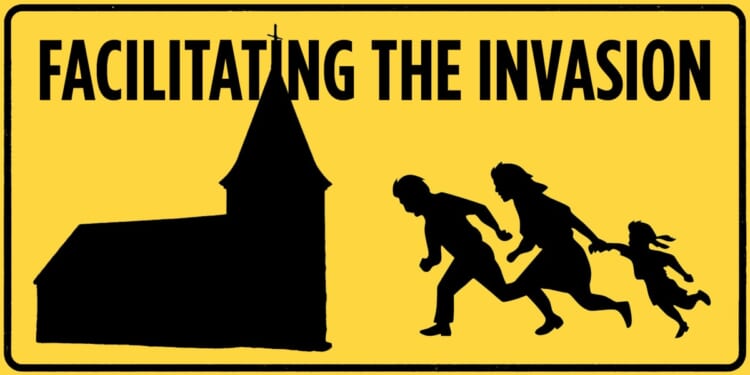Personally, as both a lifelong Catholic and as a U.S. citizen keenly interested in issues critical to our nation’s health and future, I’d prefer that our Church’s hierarchy stick to matters of faith and morals and steer clear of political hotspots.
Alas, no such luck. Last week, at their Plenary Assembly in Baltimore, the U.S. Conference of Catholic Bishops (USCCB) issued a Special Message on Immigration, a strongly worded position paper sharply critical of the Trump administration’s intense efforts to deport illegal aliens. Reportedly, the special message was approved by a near-unanimous vote by the bishops, to a chorus of enthusiastic cheers.
Our nation’s challenge in dealing with the consequences of four years of open borders is a fiercely partisan, hotly contested matter. In my view, it’s not particularly helpful for the Church to put its finger on the scale and influence the political views of the more than 50 million adult Catholics in the U.S.
In a nutshell, the USCCB’s special message is that the Catholic bishops abhor every aspect of current U.S. policy on immigration. All of it. But my layman’s assessment of their treatise is this: It is simplistic, loaded with political bias, and woefully short on context and balance. Examples:
- Throughout, the tone and language of the USCCB document and much of the supportive Catholic press commentary mirror that of the standard liberal positions held by Democrats and pushed by left-leaning media. The National Catholic Register went so far as to praise the bishops for their “resistance” (sound familiar?) rather than capitulation to the Trump administration’s policy. There is no doubt at all about which side of the U.S. political debate on illegal immigration they support.
The dead giveaway here is that nowhere in the bishops’ message is there any mention of the distinction between legal and illegal immigrants — every reference in the document uses the term “immigrant.” It extols the historical contribution of immigrants to the well-being of our nation — unquestionably true — but it wholly ignores the huge detrimental consequences of having millions of unvetted illegal immigrants in our midst.
- A central element of the bishops’ special message is the moral necessity of treating all humans with dignity — and I hope that our nation would always strive to do so. But the bishops assert that our policies and practices do not afford them that dignity — that immigrants are vilified and subjected to dehumanizing treatment. Evidently, the bishops accept at face value the Left’s endless stories of Gestapo-like masked agents in unmarked vans who routinely “disappear” likely illegal immigrants, detain them in isolated, overcrowded facilities where they are unable to contact family members, and deny them access to legal counsel.
Is that true? Or is it a gross exaggeration? We don’t know: Conservative news outlets paint a very different picture. Given the very large numbers involved, it seems likely that the truth is somewhere in the middle and that there are cases of poor treatment that we should work to correct.
On this issue, it is also important to recognize that the disruptive, often violent interference by protesters effectively transforms what should be simple, justifiable arrests into very dangerous confrontations. I’ve no doubt that ICE agents being pelted with rocks, fireworks, epithets — and sometimes gunfire — act roughly and abruptly in apprehending their targets.
- The bishops object strongly to what they call “indiscriminate mass deportation” — but the administration argues that the deportations are not indiscriminate, that in all cases they are targeting known or suspected criminal elements, and that simultaneous apprehension of others determined to be illegal immigrants is incidental.
In my view, this assertion has merit. The Trump administration’s deportation process is, to some degree, schizophrenic. Officials want to deport known dangerous immigrants (those with criminal records and gang members, for example) as quickly as possible, but they also want to rack up big numbers of total deportations. The juxtaposition of those two very different objectives can interfere with both.
I’ve argued in these columns that Trump must clarify his administration’s intent and that deportation of all immigrants residing here illegally is an unrealistic and unnecessary goal — surely there are cases in which a conditional non-voting residence status could be arranged.
- The bishops’ Special Message is widely praised as being balanced, but it falls short in that respect. Their assertion that “Human dignity and national security are not in conflict” sounds nice, but it ignores the fundamental quandary facing our country: the presence of 12 million (and probably more) unvetted illegal immigrants constitutes a very real threat to national security and to the safety of the American communities, and it demands aggressive rapid actions of the kind that theCatholic bishops deem unacceptable.
Similarly, it’s good to know that the bishops are praying for an end to “violence, whether directed at immigrants or at law enforcement,” but the words “or at law enforcement” are the only indication of concern in the entire document about the daily, violent opposition to federal agents by organized protesters who are encouraged, aided, and abetted by high-profile elected Democrat leaders (Illinois Governor JB Pritzker, for example). That is a primary contributor to the immigration dysfunction that the Catholic bishops find so worrisome.
In summary, the Catholic bishops express great concern for the dignity and fair treatment of immigrants — but much less concern for the security of our nation, minimal concern for the dignity and safety of federal law enforcement (ICE agents) under attack in the line of duty, and no concern at all for the victims of criminal alien immigrants whom we’ve carelessly invited into our country.
Dealing with the consequences of four years of uncontrolled illegal immigration is a huge, multifaceted problem. The Catholic bishops have identified real flaws in our nation’s current practices in addressing that problem; they offer platitudes but not constructive proposals to solve it.
And, in fairness to the Catholic bishops (and perhaps to avoid excommunication), let me point out the obvious: The Catholic Church and the U.S. government have two overlapping but distinct constituencies. Guidance from the Catholic bishops to their flock on matters of faith and morals is vitally important. For those matters that bridge moral and political issues, it’s up to U.S. Catholics who are also voters to consider all factors and all sources of guidance in deciding how to cast their ballots.
















